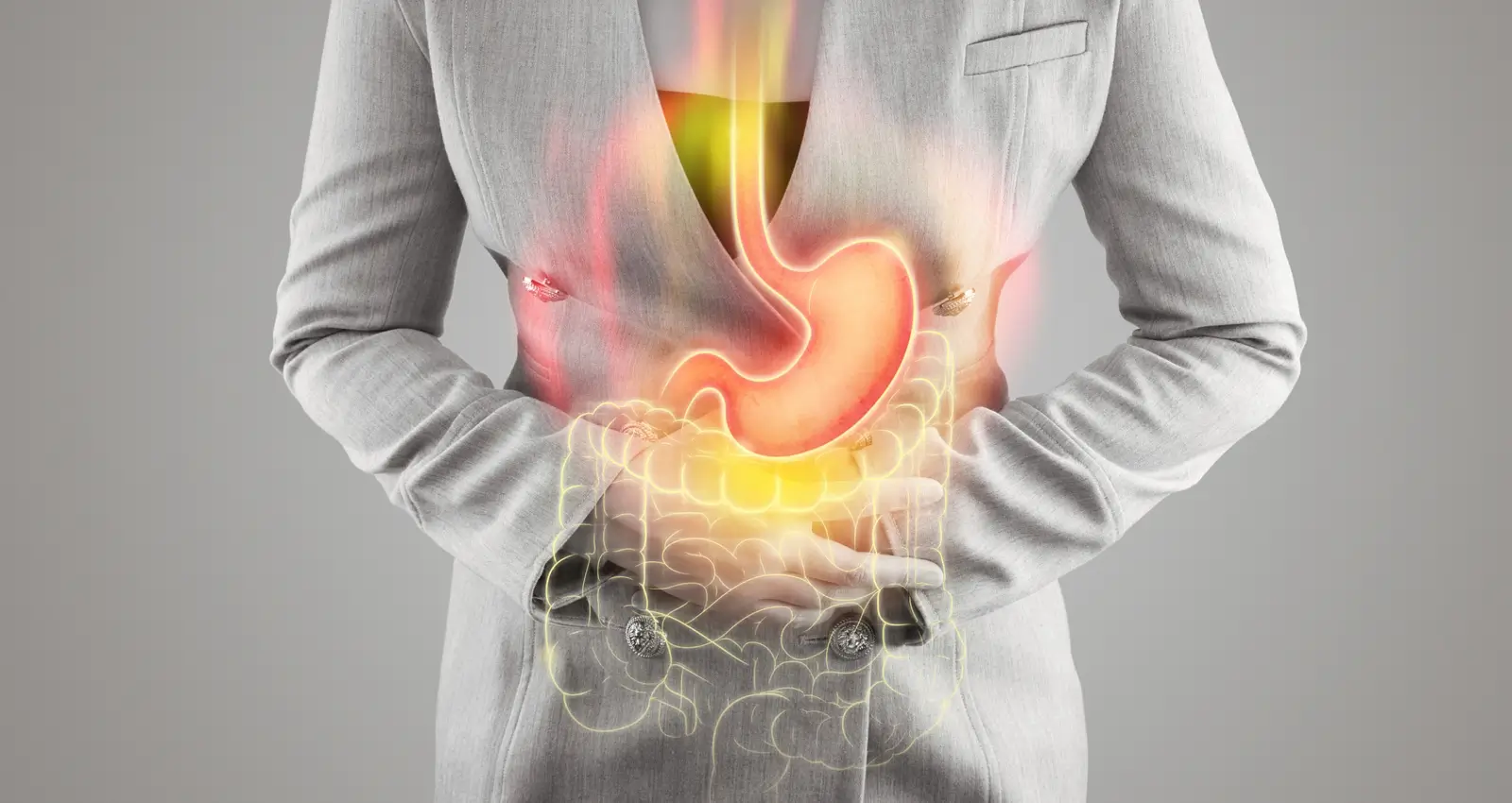After dinner, you might find yourself with an uncomfortable burning sensation in your chest. Initially, you might think it’s just indigestion, but if it persists, you may be experiencing acid reflux (via American Academy of Family Physicians). If this happens several times a week, you might have the chronic form known as gastroesophageal reflux disease or GERD (via Healthline).
To put it simply: When you eat, food moves from your esophagus to your stomach. At the end of your esophagus is a muscle called the lower esophageal sphincter (LES), which acts as a safety valve to keep stomach acid where it belongs (via Healthline). If the LES weakens, stomach acid can escape into the esophagus, causing symptoms like heartburn, as explained by the American Academy of Family Physicians.
The positive news is that dietary changes can significantly impact the frequency and severity of acid reflux. While there isn’t a universal diet for everyone, certain patterns suggest which foods to eat and which to avoid.
Avoid: French fries
Unfortunately for french fry fans, this fast-food staple can aggravate acid reflux due to its high-fat content. When it comes to acid reflux, fat is not your ally.
According to Healthline, foods rich in fat can trigger acid reflux in two ways. They can reduce the pressure on the lower esophageal sphincter, hindering its function. Additionally, high-fat foods slow down stomach emptying, increasing the risk of acid escaping into the esophagus.
There is a silver lining, though. As Healthline points out, the amount of food consumed matters in acid reflux. So, if you’re out with a friend and sneak a couple of fries from their plate, it likely won’t trigger symptoms. Nevertheless, keeping a food diary is recommended to note any sensitivities.
Eat: Saltine Crackers
While it may sound like an old home remedy, don’t underestimate the wisdom of past generations. Dr. C. Prakash Gyawali tells Livestrong that while eating in general can help neutralize stomach acid, “crackers have been noted to reduce the burning sensation” associated with acid reflux. However, there are some considerations.
Crackers may seem bland on their own, but for reducing heartburn, bland is beneficial. Adding butter or margarine can exacerbate symptoms due to fat content, which affects LES function and stomach emptying (via Healthline).
As for salted crackers, Dr. Gyawali notes that whether they are salted or unsalted may not matter for acid reflux, but excessive salt intake can lead to other health issues.
Avoid: Coffee
Unfortunately, several popular foods can trigger acid reflux, including coffee, a morning staple for many. Healthcare professionals often recommend reducing or eliminating coffee consumption if dealing with chronic acid reflux or GERD. But is coffee undeservedly blamed?
As Medical News Today explains, caffeine in coffee is believed to worsen GERD symptoms for some. However, Stanford University’s Lauren B. Gerson mentioned to Gastroenterology & Hepatology that no studies have determined the effects of eliminating caffeine on acid reflux.
Despite the lack of official evidence, some report coffee aggravates their acid reflux (via Medical News Today). Individual reactions to foods and drinks vary. If you suspect coffee triggers your acid reflux, try reducing its intake to see if symptoms improve.
Eat: Licorice
Licorice’s strong taste is polarizing, but for those with acid reflux, licorice tea might ease heartburn symptoms.
According to Healthline, many herbal teas are beneficial for digestion and nausea, but licorice tea, in particular, aids in preventing stomach acid from irritating the esophagus by promoting mucus production. Mucus, not just found in the respiratory system, acts as a protective barrier against stomach acid in the esophagus.
Chamomile, marshmallow, and slippery elm teas also alleviate acid reflux symptoms (via Healthline). However, consult with healthcare professionals as certain herbs may interact with medications. Mint teas, containing spearmint and peppermint, can worsen symptoms.
Avoid: Soda
On the surface, the reason soda might aggravate acid reflux seems straightforward. Many sodas contain caffeine, and while scientific evidence is lacking, enough people report caffeine as a contributing factor to heartburn and other symptoms, leading healthcare professionals to advise cutting down or eliminating it (via Medical News Today).
Is decaf soda the solution? Unfortunately, no. As Health explains, bubbles in carbonated drinks like soda expand in the stomach, putting pressure on the lower esophageal sphincter. Think of it like shaking a bottle of champagne; the bubbles build pressure behind the cork until it pops, allowing liquid to escape. Acidic sodas further increase the chances of acid reflux-related heartburn.
While decaf soda might be a better option, it’s best to avoid carbonated drinks when dealing with acid reflux, including seltzer water, club sodas, and some energy drinks.
Eat: Oatmeal
Though not labeled as the breakfast of champions, oatmeal can help manage acid reflux symptoms thanks to its fiber and whole grains.
Fiber can aid those struggling with weight loss by promoting a sense of fullness (via Livestrong). Portion size is crucial with acid reflux, and fiber can reduce meal size and the likelihood of stomach acid entering the esophagus. Additionally, research in Gut shows a connection between higher fiber intake and fewer acid reflux symptoms (via Livestrong).
Whole grain oats in oatmeal can aid with diabetes, cardiovascular disease, and acid reflux, as per guidelines from The American College of Gastroenterology (via Livestrong). What you add to your oatmeal matters; consider honey instead of chocolate to manage reflux symptoms.
Avoid: Beer
Beer, a carbonated beverage, can trigger acid reflux symptoms (via Health). But switching to whisky, gin, or other non-carbonated alcoholic drinks isn’t a solution.
Healthline notes that alcohol can trigger acid reflux by relaxing the lower esophageal sphincter and increasing stomach acid. These factors alone can cause problems, and alcohol also makes it harder for the esophagus to clear stomach acid, leading to heartburn and other reflux symptoms.
Even moderate alcohol consumption can cause acid reflux in individuals who didn’t have it before (via Healthline). Additionally, what you eat or don’t eat while drinking affects alcohol absorption. It’s advisable to avoid these beverages.
Eat: Honey
Disney’s Mary Poppins suggests “a spoonful of sugar helps the medicine go down,” but honey might be a better choice. This sweet substance can help treat peptic ulcers, diarrhea, and acid reflux (via Healthline).
While more research is needed to understand honey’s connection to acid reflux, a 2013 report in the Indian Journal of Medical Research highlighted ways honey can ease reflux symptoms. It may provide an additional protective coating for the esophagus, decrease inflammation, and remove free radicals from the digestive tract.
Free radicals are unstable molecules created during normal cellular processes that can cause damage (via the National Cancer Center). Honey’s removal of these molecules strengthens the digestive system, reducing susceptibility to acid reflux. Honey can be an effective “medicine” for reflux symptoms (via Healthline). If the taste is too sweet, try it in tea or warm water.
Avoid: Chocolate
Sadly, chocolate is a no-go for those with acid reflux. Besides being a caffeinated food, chocolate is high in fat, which slows stomach emptying and affects LES function, making acid reflux more likely.
Chocolate also contains methylxanthine, which can relax the LES (via Medical News Today), allowing more stomach acid to leak into the esophagus, causing heartburn.
Chocolate-containing foods can worsen acid reflux. For example, chocolate-covered bacon and potato chips, already high in fat, are worse choices for reflux (via Medical News Today). Combining them with chocolate can trigger severe reflux-related heartburn.
Eat: Ginger
While ginger ale might be your go-to for an upset stomach, ginger alone is beneficial for heartburn relief from acid reflux. According to Johns Hopkins Medicine, a food’s acidity level determines its potential to trigger reflux symptoms. The more acidic, the more likely it is to cause issues like heartburn.
Ginger is low in acid, classifying it as an alkaline food that can counteract stomach acid (via Johns Hopkins Medicine). Additionally, ginger is an anti-inflammatory and an excellent digestive aid. If acid reflux symptoms start, consider drinking ginger tea to prevent them from worsening.
However, skip the ginger ale. The carbonation can worsen reflux and negate ginger’s benefits (via Health).
Avoid: Dairy products
Identifying acid reflux triggers can be challenging. Take dairy, for instance. While some with reflux can tolerate cow’s milk, others experience heartburn. Why is that?
The fat content in milk plays a significant role in acid reflux. Higher fat content slows stomach emptying, reduces LES function, and increases the likelihood of acid backflow into the esophagus (via Healthline). Opt for fat-free or low-fat milk if you have acid reflux, instead of whole milk.
Lactose intolerance may also aggravate acid reflux. A 2011 study in Gut and Liver found a link between reflux and milk allergy.
Eat: Applesauce
Preparation can make a difference for acid reflux. For instance, substituting applesauce for butter or oil in recipes can reduce heartburn risk (via Health). However, there’s a catch with apple products and reflux. Healthline notes apple juice is acidic, and high acidity in foods worsens reflux symptoms (via Johns Hopkins Medicine). The Nutrition Source notes apple cider is even more acidic.
What about a fresh apple? Apples have fiber and anti-inflammatory properties that can aid reflux. But individual sensitivities vary, making a food diary useful.
Avoid: Tomatoes
Pop quiz: Is a tomato a fruit or a vegetable? Technically, tomatoes are fruits but considered vegetables due to their nutritional content (via Encyclopedia Britannica). Regardless of the label, they can affect acid reflux.
Tomatoes and other acidic fruits, like pineapples and oranges, can worsen reflux (via Medical News Today). The rule is higher acidity increases the likelihood of triggering symptoms (via Johns Hopkins Medicine). Tomatoes, often paired with other foods, can complicate matters.
For instance, a classic pizza has tomato sauce, oils (high in fat), and dairy (contains fat and lactose) (via Healthline). This combination can lead to a severe acid reflux attack.
Eat: Balsamic vinegar
Wait, a vinegar type for acid reflux? But isn’t it like pouring battery acid into your stomach? First, never consume battery acid. Despite balsamic vinegar’s acidity, it has a beneficial component for acid reflux.
Medical News Today explains the acetic acid in balsamic vinegar contains probiotics supporting digestion. Longer stomach retention increases reflux risk (via Healthline). Balsamic vinegar can help with congestion, hypertension, and cholesterol (via Medical News Today).
Though balsamic vinegar offers benefits, it’s acidic. Proceed cautiously before adding it to your diet. Medical News Today advises trying a small amount and waiting several hours for a reaction.




